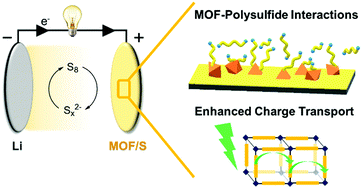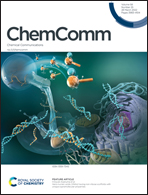Tailored porous framework materials for advancing lithium–sulfur batteries
Abstract
Despite great promise as next-generation high-capacity energy storage devices, lithium–sulfur batteries still face technical challenges in long-term cyclability. With their porous structures and facile synthesis, metal–organic frameworks (MOFs) are tunable platforms for understanding polysulfide redox and can serve as effective sulfur hosts for lithium–sulfur batteries. This feature article describes our design strategies to tailor MOF properties such as polysulfide affinity, ionic conductivity, and porosity for promoting active material utilization and charge transport efficiency. We also present engineering approaches for implementing MOF-based sulfur cathodes for lithium–sulfur batteries with high volumetric density and under low temperature operation. Our studies provide fundamental insights into sulfur–host interactions and polysulfide electrochemistry in the presence of porous matrices, inspiring future designs of advanced batteries.



 Please wait while we load your content...
Please wait while we load your content...